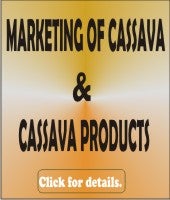Post by Ismail AbdulAzeez on Jan 10, 2021 16:58:24 GMT 1
Importation is highly capital intensive and it requires such business owners to maintain adequate working capital at all times in order to run their businesses smoothly and profitably.
Import finance helps import traders bring in their goods into the country and to fund their business goals easily. Sometimes international traders will need some credit options to cushion the effect of cash flow problems in their businesses.
An import loan is simply a short-term cash advance (with interest of course) that enables the customer who is an importer to meet his immediate payment obligations under a sight or issuance of a letter of Credit presentation or Import Documentary Collection.
Let us quickly look at the various import finance options available for importers.
Usance and Standby Letter of Credit: This helps the importer to defer payment for goods purchased. The importer in this instance has the opportunity to even sell the goods before paying; he can manage his finances better without too much pressure from his international creditors. Also when a standby Letter of Credit is used for a transaction, there is a guarantee that payment will be made to sellers or creditors. International traders engaged in import and exports often prefer Letter of Credit over other financing options available to them.
Bank Guarantee: This guarantee serves as a creditworthiness of the buyer and it is usually issued by banks. This bank guarantee protects the seller against any loss or inability of the buyer to meet his contractual obligations to the buyer or the other party involved in the transaction.
Asset-Based Facility: This type of funding option allows importers to take the loan against their existing assets. The following assets can be used to secure the loan: Stock and Inventory, Buildings and Equipment, Accounts receivable and other tangible assets.
Invoice Financing: An organization can sell their account receivables to raise finance for import and other operations. Some Financial institutions can even give up to 80% of the invoice value of the goods imported as loan. This financing option helps businesses a lot as it gives the business the opportunity to raise funds easily and turn around transactions within the shortest possible time.
Practically in Nigeria import loans are provided by specialist Financial Institutions that are experienced in the processes involved. There are many variations on the systems involved, so we are going to discuss some of them that have been in vogue.
The simplest type of import financing takes place when the importer has already imported the goods and they are in the warehouse. The financial institution can give a direct loan to the importer based on the goods in the warehouse, while the goods in the warehouse are now held for the financial institution that gave the loan. When there is a confirmed order from a buyer, the buyer pays to the bank or the appropriate financier and the goods are released to the buyer with authority of the bank.
Import loans can also be arranged for goods that have not yet been imported into the country but are about to be imported. When the importer wants to raise import finance for this type of operation, there must be a documentary credit, remember that we mentioned the Documentary Letter of Credit which will enable the bank to pay the overseas seller of the goods. When this happens the bank will have the lien over the goods when they arrive. If the importer settles the local bank before the goods arrive, he takes his goods but if not the goods will be held by the bank and an import loan or finance can be arranged for the customer and the goods used as security.
Before the goods can be removed from the warehouse whether in small quantities or once, the warehouse management must receive instructions from the bank or the financing institution. There should be clear instruction in the loan agreement as to how the warehouse charges should be settled.
With import finance the importer is sure that he can pay his international trade partners without delay encouraging them to trust him more. This improves relationships and creates trust between the parties. These are qualities an importer needs for his business to run smoothly.
Import finance helps import traders bring in their goods into the country and to fund their business goals easily. Sometimes international traders will need some credit options to cushion the effect of cash flow problems in their businesses.
An import loan is simply a short-term cash advance (with interest of course) that enables the customer who is an importer to meet his immediate payment obligations under a sight or issuance of a letter of Credit presentation or Import Documentary Collection.
Let us quickly look at the various import finance options available for importers.
Usance and Standby Letter of Credit: This helps the importer to defer payment for goods purchased. The importer in this instance has the opportunity to even sell the goods before paying; he can manage his finances better without too much pressure from his international creditors. Also when a standby Letter of Credit is used for a transaction, there is a guarantee that payment will be made to sellers or creditors. International traders engaged in import and exports often prefer Letter of Credit over other financing options available to them.
Bank Guarantee: This guarantee serves as a creditworthiness of the buyer and it is usually issued by banks. This bank guarantee protects the seller against any loss or inability of the buyer to meet his contractual obligations to the buyer or the other party involved in the transaction.
Asset-Based Facility: This type of funding option allows importers to take the loan against their existing assets. The following assets can be used to secure the loan: Stock and Inventory, Buildings and Equipment, Accounts receivable and other tangible assets.
Invoice Financing: An organization can sell their account receivables to raise finance for import and other operations. Some Financial institutions can even give up to 80% of the invoice value of the goods imported as loan. This financing option helps businesses a lot as it gives the business the opportunity to raise funds easily and turn around transactions within the shortest possible time.
Practically in Nigeria import loans are provided by specialist Financial Institutions that are experienced in the processes involved. There are many variations on the systems involved, so we are going to discuss some of them that have been in vogue.
The simplest type of import financing takes place when the importer has already imported the goods and they are in the warehouse. The financial institution can give a direct loan to the importer based on the goods in the warehouse, while the goods in the warehouse are now held for the financial institution that gave the loan. When there is a confirmed order from a buyer, the buyer pays to the bank or the appropriate financier and the goods are released to the buyer with authority of the bank.
Import loans can also be arranged for goods that have not yet been imported into the country but are about to be imported. When the importer wants to raise import finance for this type of operation, there must be a documentary credit, remember that we mentioned the Documentary Letter of Credit which will enable the bank to pay the overseas seller of the goods. When this happens the bank will have the lien over the goods when they arrive. If the importer settles the local bank before the goods arrive, he takes his goods but if not the goods will be held by the bank and an import loan or finance can be arranged for the customer and the goods used as security.
Before the goods can be removed from the warehouse whether in small quantities or once, the warehouse management must receive instructions from the bank or the financing institution. There should be clear instruction in the loan agreement as to how the warehouse charges should be settled.
With import finance the importer is sure that he can pay his international trade partners without delay encouraging them to trust him more. This improves relationships and creates trust between the parties. These are qualities an importer needs for his business to run smoothly.













